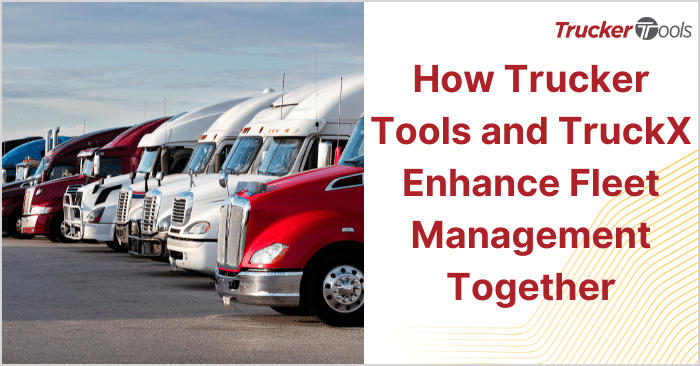In a recent webinar in partnership with FreightWaves, Trucker Tools’ Founder and CEO Prasad Gollapalli spoke with Ryder Freight Brokerage’s VP and General Manager Dave Belter about how technology can improve carrier experience and increase service levels. The webinar, entitled The Technology Mall: Why This Consolidated, Best-of-Breed App Approach Is Helping Brokers Win Over Truckers in a Capacity-Constrained Market, highlighted how critical technology has been in helping Ryder strengthen its carrier network amidst an historic capacity shortage. The webinar also included a live Q&A with participants and several polls regarding the current state of the transportation industry and technology use.
Ryder’s Approach to Technology
Belter spoke at length during the webinar about Ryder’s approach to technology and the role technology plays in providing high levels of service to both shippers and carriers.
“We focus on implementing technology that improves our business processes and improves the accuracy and speed by which information flows,” said Belter. “We’re really focused on making it easy for our customers to do business and for our carriers taking all of the friction out of business processes so that our people can focus on solving real problems. Our focus is on automating the administrative business processes around administrating loads, smarter load matching, load tracking and making that whole payment cycle quick and easy for our carriers.”
Ryder Freight Brokerage currently uses Trucker Tools’ Smart Capacity platform for real-time visibility, digital freight matching and automated load booking. Belter went on to say that one of the reasons that Ryder has partnered with Trucker Tools is the support that Trucker Tools’ free driver app offers owner operators and small to mid-sized carriers. Trucker Tools’ tech automates business processes for Ryder’s teams, while helping owner operators and carrier find the next best load, parking, the cheapest fuel and much more.
Providing a Single Point of Contact on Each Load
Gollapalli noted that over the last year, 115,000 new carriers entered the transportation industry, the majority of which were owner operators or carriers with fewer than five trucks. This fragmentation of the capacity market has made it even more challenging to share information and data between shippers, freight brokers and carriers/drivers — and to maintain relationships with carriers.
“Transportation is a people business,” Belter said. “It does take people to move freight and at the end of the day, technology can help that business process, but we still need to communicate with one another, whether I’m a driver, I’m an owner operator or I’m a I’m an account executive in a brokerage. It’s one of the reasons that we like to have our account executives own the load from order through delivery andprovide our carriers with a single point of contact throughout the lifecycle of the load. One of the exciting things that we’re going to do in 2022 is to put RyderShare on top of our freight brokerage technology that will allow more of a chat collaboration capability where it’ll be even faster and easier to collaborate, solve problems or communicate simple updates outside of the visibility and tracking that we get out of Trucker Tools. Communication is everything, but we want to be able to communicate person to person around the big problems and let technology step in for the simple stuff. We have to make it simple and easy to engage with us, no matter what the preferences of our customers or our carriers are. We can utilize technology and automation within that technology to free up our people up to be available to provide that concierge level of service.”

How Technology Can Impact Service Levels and Relationships
“The way we’ve organized ourselves is to put the key focus on the service aspect of our brokerage business,” Belter shared. “We want our account executives to own each and every load from order to delivery and to be that quarterback not only for the customer, but for the carrier, too. We’re providing that single point of contact, whether that contact comes through a chat, an email or a telephone call. Managing the lifecycle of the load and being engaged at that level with that tactical strategy is what really allows us to be highly service-focused. Our customer and our carrier knows exactly where to go when they need something and that helps you build stronger relationships.”
Belter went on to illustrate how specific types of technology like the document upload tool in the Trucker Tools driver app strengthens relationships with shippers and carriers. As Belter noted in the webinar, many shippers require proofs of delivery as part of the payment process. Digitizing that process with the Trucker Tools app speeds everything up. It allows Ryder to bill customers quickly because the company isn’t waiting on an invoice to come through the mail or email. The doc upload tool in the Trucker Tools app benefits carriers because it helps them get paid faster, often the next day. Belter stressed that you have to be willing to do business in the manner that is easiest for carriers and shippers and that often involves leveraging the agility and flexibility offered by technology.
For the rest of the conversation, watch The Technology Mall: Why This Consolidated, Best-of-Breed App Approach Is Helping Brokers Win Over Truckers in a Capacity-Constrained Market on demand.






